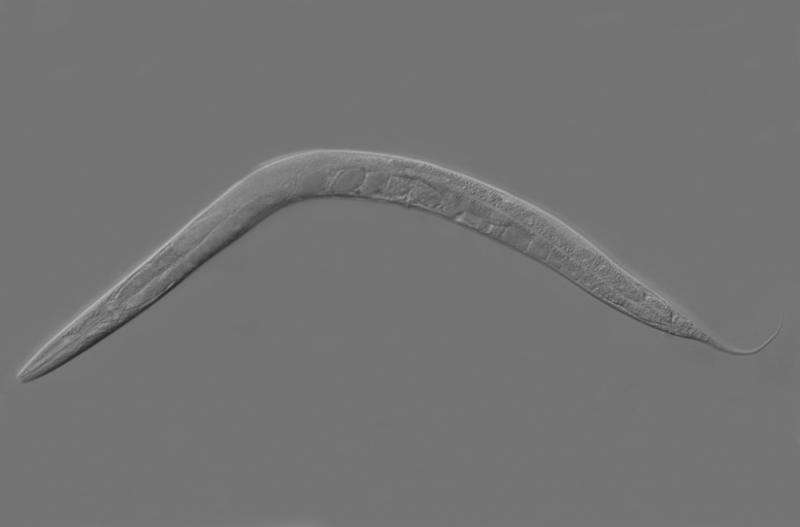C. elegans roundworms 'harvest' an essential coenzyme from the bacteria they consume

A study conducted in C. elegans nematode roundworms may lead to improved treatment of a rare human genetic disorder that causes severe neurological symptoms leading to death in early childhood. In their report published in Nature Chemical Biology, two Massachusetts General Hospital (MGH) investigators describe finding that C. elegans can acquire the molybdenum cofactor (Moco) - a molecule essential to the function of essential enzymes—by consuming E.coli bacteria, the first evidence that Moco can be transferred between species. The investigators also identified the metabolic pathway that is responsible for the symptoms observed in Moco deficiency.
"Until now, Moco was thought to be too unstable to be trafficked between cells and tissues, much less between organisms separated by a billion years of evolution," says lead author Kurt Warnhoff, Ph.D., MGH Molecular Biology. "But we found the interaction between these species to be quite robust. Bacteria isolated from rotting fruit—a typical C. elegans habitat—were able to supply Moco to the nematodes. This ability of C. elegans to extract Moco from its microbiome is intriguing and offers hope that we might be able to exploit similar systems to deliver mature Moco to patients with Moco deficiency."
Many reactions essential to life require the action of enzymes, several of which, in turn, require molecules called cofactors or coenzymes to function correctly. One such coenzyme, Moco, is required for the incorporation of the element molybdenum into several important enzymes. In humans, genetic mutations in Moco-synthesizing enzymes cause Moco deficiency. Affected infants develop seizures, deterioration of brain tissue, developmental delay and usually die within the first few months of life. Moco deficiency is estimated to affect 1 in 100,000 to 200,000 births.
Healthy animals from C. elegans to humans can synthesize Moco within their bodies. In mutant C. elegans that cannot synthesize Moco, normal development halts and the animals die unless fed a bacterial diet featuring the coenzyme, paralleling the effects of Moco deficiency in humans. Using C. elegans genetics to investigate how Moco deficiency leads to death, Warnhoff and senior author Gary Ruvkun, Ph.D., also of MGH Molecular Biology, identified the pathway that normally breaks down the sulfur-containing amino acids methionine and cysteine as the culprit. A byproduct of that breakdown is the release of sulfite, a toxin used as a preservative in many foods, and the researchers found that lack of Moco inactivates the SUOX enzyme that normally detoxifies sulfite, leading to death of the nematodes.
Says Ruvkun, a professor of Genetics at Harvard Medical School, "These molecular insights offer potential therapeutic avenues for treating Moco deficiency. Limiting exposure to sulfur-containing compounds and inactivating the enzymes that generate sulfite might alleviate the physiologic defects and resultant death that are inevitable in human Moco deficiency."
Finding that simply ingesting Moco-producing E.coli was sufficient to support the growth and development of Moco-deficient C. elegans suggests that the coenzyme might function as a vitamin. The researchers found that around two-thirds of bacterial genomes synthesize Moco, indicating that the nematodes could depend on bacteria to supply this essential cofactor most of the time. Now Warnhoff and Ruvkun and working to discern how C. elegans determines when to synthesize Moco within its body and when to ingest as a "dietary supplement," from the bacteria it consumes.
More information: Kurt Warnhoff et al, Molybdenum cofactor transfer from bacteria to nematode mediates sulfite detoxification, Nature Chemical Biology (2019). DOI: 10.1038/s41589-019-0249-y
Journal information: Nature Chemical Biology
Provided by Massachusetts General Hospital


















